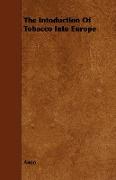- Start
- The Intoduction of Tobacco Into Europe
The Intoduction of Tobacco Into Europe
Angebote / Angebote:
The Introduction of Tobacco into Europe In the four preceding leaflets the history and use of tobacco in the two Americas, in Melanesia, and in Asia have been briefly discussed. It may therefore not be amiss to close this series with a review of the early history of tobacco in Europe, particularly in England, --a subject of general interest. The white man learned the use of tobacco from the aborigines of America soon after the discovery, and the European colonists who flocked to America rapidly adopted the habit of smoking. Las Casas was already compelled to admit that the Spaniards on Cuba who had contracted the habit could not be weaned from it. Lescarbot applies a similar remark to the French of Canada. Our Frenchmen who visited the savages are for the most part infatuated with this in- toxication of petun tobacco, so much so that they cannot dispense with it, no more than with eating and drinking, and they spend good money on this, for the good petun which comes from Brazil sometimes costs a dollar km the pound. John Hawkins observed in 1564 that the French in Florida used tobacco for the same purposes as We natives. A. Thevet, who visited Brazil in 1555-56, noticed the Christians living there as marvelously eager for this herb and perfume. Gabriel Soares de Souza Noticia do Brazil, mitten in 1587, a Portuguese farmer, who lived in Brazil for seventeen years from about 1570, informs us that tobacco leaves were much esteemed by the Indians, Negroes whom he calls Mamelucos, and Portuguese, who drank the smoke by placing together many leaves wrapped in a palm-leaf they used, accordingly, the cigar. The unknown author of the Treatise of Brazil, written in 1601 and published by Purchas, also describes the mode of cigar-smoking in Brazil and winds up by saying, The women also doe drinke it, but they are such as are old and sickly, for it is very medicinable unto them, especially for the cough, the head-ache, and the disease of the stomache, and hence come a great many of the Portugals to drinke it, and have taken it for a vice or for idlenesse, imitating the Indians to spend days and nights about it. The English colonists in Virginia did not hesitate to appropriate the aboriginal custom of pipe- smoking. Thomas Hariot A Brief and True Report of the New Found Land of Virginia, 1588 dwells with enthusiasm on the virtues of the herb, which is sowed a part by itself and is called by the inhabitants upon In the West Indies it hath divers names, according to the several places and countries where it groweth and is used The Spaniards generally call it Tobacco. He concludes, We our selves during the time we were there used to suck it after their maner, as also since our return, and have found many rare and wonderful experiments of the vertues thereof of which the relation would require a volume by itself the use of it by so many of late, men and women of great calling as else, and some learned Phisitions also, insufficient witnes. Sucking it after their maner means pipe-smoking which Hariot himself describes as follows The leaves thereof being dried and brought into powder they use to take the fume or smoke thereof by sucking it through pipes made of clay into their stomache and head. The following passages show that the English settlers soon proceeded to make their own pipes...
Folgt in ca. 10 Arbeitstagen
